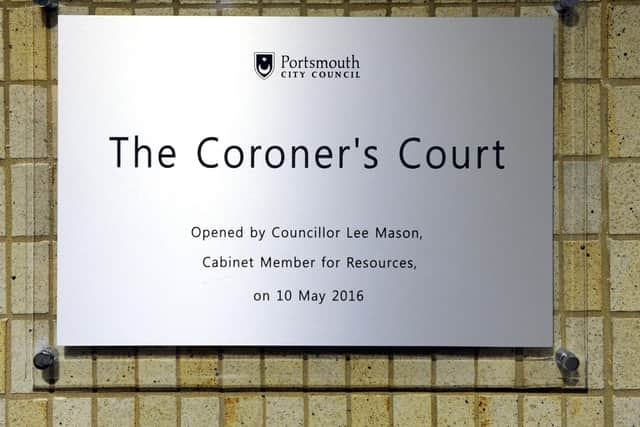Inquest continues to investigate death of woman who died days after being discharged from hospital
and live on Freeview channel 276
The second day of Victoria Wemyss’s two-part inquest resumed this morning (April 19) at Portsmouth Coroner’s Court, investigating the events that led to her death on August 21, 2021, when her body was found in Candy’s Pit, London Road – three days after being discharged from hospital.
Victoria was admitted to the Hawthorn Ward at The Orchards and Limes AMH Inpatient Unit hospital on August 13 after being sectioned under Section 2 of the Mental Health Act. The 30-year-old had a history of chronic mental health disorders after being diagnosed with manic depression in 2013 and a psychotic disorder in 2016 as well as professionals suggesting that she could have also been experiencing symptoms of.
Advertisement
Hide AdAdvertisement
Hide AdThe inquest heard how the reasoning behind Victoria’s sectioning was due to being non-compliant in taking her antipsychotic medication as well as being deemed a "high risk to health and self” which “if not treated, risk to her health and self will increase.”
During her time in the ward, she was placed in an ‘isolation corridor’ in line with the Covid guidelines at the time which meant that 15 minutes observations were conducted by nursing staff but, where possible, would be done at a distance. These 15 minute observations would continue throughout the night and during a witness statement from a staff nurse at the time, the inquest heard how staff would observe patients through the door window to ensure they were asleep or calm.
During the witness interview, Mr Wemyss, Victoria’s father, said: “It could be that she was just lying down in bed with her eyes closed - it’s difficult because although her demeanour was calm, observations from our experience is that she would lay down and try to cancel the voices out - she was trying to cope with the voices in her head at that time but just because she seems well it doesn’t mean she is well with her mental state.
“We observed her doing this at home.”
It was also heard how there were no clerking notes upon Victoria’s admission to hospital which was not the standard policy. During her time at the hospital, Victoria had an episode were she was “shouting, screaming, hearing voices and being agitated” and anti-agitation medication was needed to calm her.
Advertisement
Hide AdAdvertisement
Hide AdA nurse spent one-on-one time with Victoria where she was told that she “has been given commands to hurt herself” and she “does not think anything helped to quieten down the voices.” The episode, which happened on August 16, was deemed to be a "one off” and she was discharged on Wednesday, August 18.
The inquest heard today how after Victoria’s discharge, she was due to be contacted by the Crisis Resolution Home Treatment Team within 72 hours of her going home. An appointment was arranged with a member of the team on Friday, August 19 at 4pm but due to staff shortages they were unable to make the scheduled visit. A member of staff offered Victoria a time later that day, but she refused, re-arranging for the Saturday which she then rescheduled again for Sunday, August 21.
During an interview with Louise Norris, a social worker with the crisis team until last September, the court heard how the 72 hour policy of a check up was breached on Saturday. Victoria died the day of her rescheduled appointment.


Ms Norris said: “I would expect normal practice to be inquisitive and ask why the appointment was requested to be moved.”
Advertisement
Hide AdAdvertisement
Hide AdMs Norris also said that some people experiencing mental health problems can struggle engaging with the crisis team due to the fact that patients see a number of different members of staff rather than building up a relationship with any one crisis worker.
As a result of Victoria’s death, Solent NHS Trust conducted a serious incident report which found that there were instances were standard policy was not adhered to and that, as a result, changes have been made.
During the interview of Ben Martin-Lihou, head of quality and professions at Solent NHS Trust, who was responsible for the serious incident report, Mr Wemyss directed concern for future policies.
Mr Wemyss added: “It is clear that changes have been made to policies and procedures following the serious incident report and I welcome that. However, in turn this implies that risks pertinent to Vikki’s care were not considered.
Advertisement
Hide AdAdvertisement
Hide Ad“History is an easy guide to the future and Vikki’s history should have been considered. Don’t you think it was negligent not to do that and given the policies that should have been adhered to, weren’t adhered to in Vikki’s case, how can any reliance be placed on changes to policies to make them anymore effective?”
In response to Mr Wemyss’s question, Mr Martin-Lihou said: “It is absolutely awful that learning occurs after a tragic incident. We have used what we have learnt from Vikki’s case to make changes - there were things that weren’t done the way we are doing them now that had an impact on Vikki, that’s really clear.”
The coroner has adjourned the inquest until next week in order to make his conclusion.
Comment Guidelines
National World encourages reader discussion on our stories. User feedback, insights and back-and-forth exchanges add a rich layer of context to reporting. Please review our Community Guidelines before commenting.
